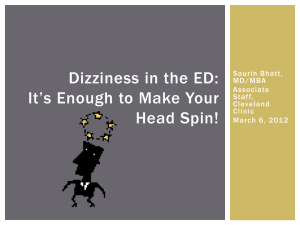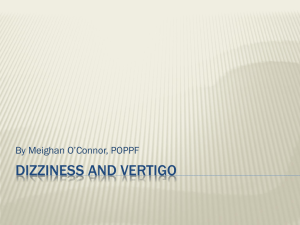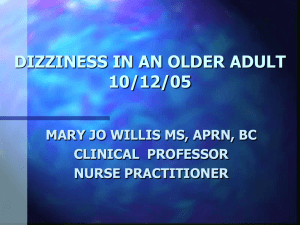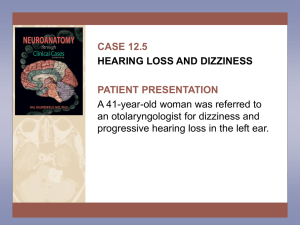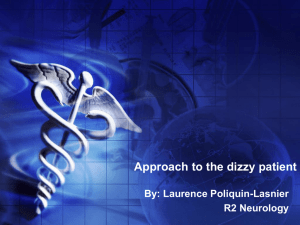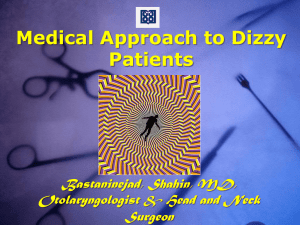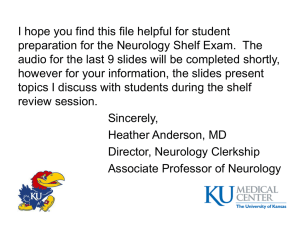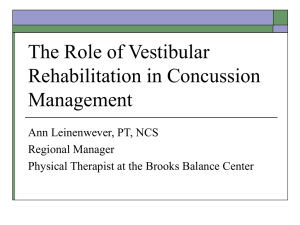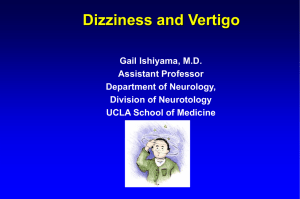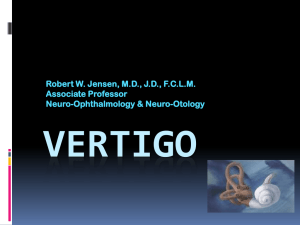Dizziness - Scioto County Medical Society
advertisement
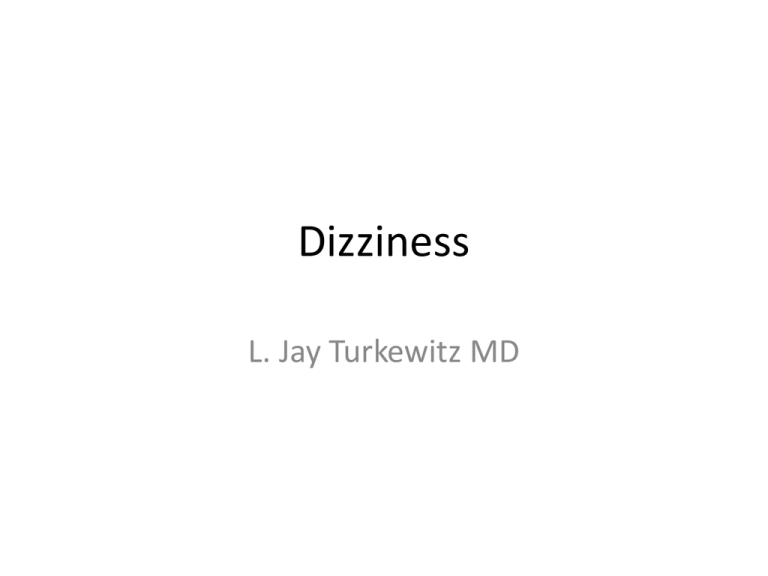
Dizziness L. Jay Turkewitz MD Dizziness • One of the most common complaints in all practice • Affects 20-30% of the population • I have been hospitalized twice in my life with severe vertigo and uncontrolled vomiting Dizziness • Makes up a tremendous number of ER and Urgent Care visits. • True persistent dizziness can lead to falls, and subsequent injuries and substantial day to day dysfunction of daily activities. • Balance related falls leads to death in the elderly—i.e. hip fracture and subsequent blood clots and pulmonary embolus or subdurals but rarely are these falls due to VERTIGO Dizziness • Nonspecific when the patient walks in and says I am dizzy • Your job is to figure out what the patient means by dizziness • The key issue is whether the patient has true Vertigo a sense of rotation. Dizziness • There is a specific “Dizziness” clinic at Mayo’s • Classic paper by Daniel Drachman on the % of patients with various symptoms who complain of dizziness • True Neurological vertigo is RARE Dizziness • • • • Vertigo Neurologic Presyncope NON Neurologic Disequilibrium Often Neurologic Lightheadedness Rarely Neurologic VERTIGO • VERTIGO Dizziness • Vertigo, The illusion or sense of a spinning rotation of the room BUT it may be the patient who feels they are doing the spinning BUT there is a sense of rotation! • Peripheral vs Central • Peripheral is a reflection of disorders of the semicircular canals, utricle –the Vestibular End Organs or the 8th Nerve (ENT Docs say 8th nerve vertigo is central!) • Central Vertigo implies dysfunction of the Vestibular Nuclear Connections or Cerebellum (less likely) • The book is misleading on this point Dizziness • • • • • • • • Peripheral Vertigo Prominent Nausea and Vomiting Unidirectional Nystagumus Sudden Onset Auditory Issues such as Hearing Loss or Tinnitus May be positional Very Disabling Delay anf fatigue Dizziness • • • • • • • Central Vertigo Nystagmus is variable Less prominent nausea and vomiting May not be disabling Variable onset No hearing issues Other brainstem findings Dizziness • • • • • • • • Presyncope The sensation that one is about to faint “feel faint” Nausea Dimming of Vision Sweating Tremor Cardiovascular, Metabolic or much less likely Hematologic in nature Disequilibrium • The sense one is about to fall • Motor weakness may cause this • Loss of sensory input from neuropathy may cause this • Balance and gait are the issues! Dizziness • • • • • • • • Lightheadedness Non specific Hyperventilation is the classic Psych issues Meds Altered Sensorium Non specific My 8th grade auditorium Dizziness • Vertigo • Central Vertigo always requires immediate evaluation including neuro imaging • Must eliminate the possibility of a posterior fossa mass pressing on the brainstem or primary brainstem pathology. Dizziness • • • • • • • • Peripheral Vertigo Sudden Brief Attacks Fall to the ground Spells of Tumarken No pre-syncope No seizure stigmata Nausea, vomiting and uni-directional nystagmus Peripheral Nystagmus (Horizontal with a Rotatory Component) Dampens with Fixation! Dizziness • Central Vertigo • Often a more gradual onset • They may not be able to walk but this may reflect other issues including hemiparesis • Vertical Nystagmus is always of central origin • Unlike peripheral nystagmus central nystagmus may persist beyond 48 hours. • Peripheral Vertigo always compensates over time Dizziness • Brainstem Lesions Which Cause Vertigo • Always involves other tracts, motor, sensory or other cranial nerve nuclei so look for signs of other deficits on Neuro exam • Wallenberg’s Syndrome in the distribution of the Posterior Inferior Cerebellar Artery BUT usually due to vertebral occlusive disease is the classic brainstem syndrome causing vertigo Dizziness • • • • • • • • Wallenberg’s Infarction of Vestibular Nuclei Ipsilateral Horner’s Sundrome Ipsilateral Facial Numbness Contralateral Limb Numbness Dyphagia Dysarthria Diplopia Dizziness • Cerebellar Lesions Causing Vertigo • Cerebellar Infarcts (Medical Emergency)— Swell and compress the brainstem (posterior Fossa Herniation Syndrome) • Cerebellar signs- Past pointing, dysmetria, dysdiadokinesis (rapid alternating movements) Dizziness • Vertigo associated with transient Brainstem Ischemia • Vertebrobasilar Insufficiency---diplopia, transient homonomous visual defects, dyarthria • Drop Attacks VBI but patient does not lose consciousness Dizziness • Brainstem Stroke has a myriad of features! • Any stroke’s findings is a reflection of the affected artery and it’s collateral blood flow • Opthalmoplegia • Hearing Loss • Visual Field Defects • Sensory Loss • Ataxia • MONOCULAR BLINDNESS IS ANTERIOR CIRCULATION Dizziness • • • • • • • • Cerebellar Bleeds Headache Nausea Vomiting Nystagmus Ataxia of Gait Depressed Level of Consciousness EMERGENCY SURGERY! Prevent Herniation of Cerebellum into the Brainstem Dizziness • Multiple Sclerosis Dizziness • Peripheral Causes of Vertigo Much More Common than Central Causes…Statistically whenever you see someone with severe Vertigo is usually peripheral. Dizziness • • • • • • • BPPV (Benign Paroxysmal Positional Vertigo) Most common cause of vertigo Usually elderly Positional One side or the other DOWN on the Pillow Latency Fatigue with repetitive episodes, Lasts 60 seconds per episode Cupulolitiasis----Debris from the Utricle flowing freely in the semi-circular canals endolymph • This acts as a plug like a plunger causing a push and pull effect on the cupula creating asymetric neural impulses from the ears WHICH IS THE MECHANISM of Peripheral Vertigo and Nystagmus! • Rolling Over in Bed much more often than LOOKING UP! Dizziness • Vestibular Neuronitis • Probably akin to the same mechanism as Bell’s Palsy (reactivation of latent Herpes Virus BUT affecting the vestibular portion of the 8th nerve) • Often after a viral infection • May be a viral infection of the vestibular apparatus this is not like the book says NUCLEAR this is PERIPHERAL NOT CENTRAL • Lasts weeks but the acute vertigo is over after about 48 hours and the patient then feels disequilibrium for about 6-8 weeks. The vertigo can be recurrent during that time frame. Dizziness • Labyrinthitis • By definition there is a decrease in hearing unlike vestibular neuronitis • The Labyrinthe is affected • Can be viral or bacterial or spirochetal • The end organ of hearing is involved by definition • Otitis Media bacterial spread through a ruptured membrane or a perilymph fistula Dizziness • These patients with labyrinthitis usually appear quite ill and have fever. • Unlike vestibular neuronitis where fever is uncommon • If you have Labyrinthitis there must be hearing loss and usually vertigo with nausea vomiting a peripheral pattern of nystagmus • ENT Emergency Dizziness • • • • • • Ramsay Hunt Syndrome Varicella Zoster Virus reactivation Affects Cranial Nerves 7 and 8 Facial Paresis Tinnitus Hearing Loss and Vertigo Dizziness • Meniere’s Disease • Very Overdiagnosed..Occurs as attacks • Low Frequency Sensory Neural Hearing Loss is the HALLMARK Hearing Loss may fluctuate • Increase in the volume of Endolymph which has led to various therapeutic interventions • Distension of the Endolymphatic System • Severe Vertigo Nausea Vomiting with a peripheral pattern of Nystagmus • Attacks last minutes to hours, Ear fullness or pain • Abrupt Spells of Tumarkan Fall to the Floor! • Usually unilateral but may be bilateral Dizziness • • • • Acoustic Neuroma Slow Unilateral Hearing Loss and Tinnitus Schwanoma of the acoustic nerve Begins on vestibular portion but affects hearing first • Slow growth is the reason vertigo rarely develops • Cranial nerves 5 and 7 This is the classic cerebello-pontine angle lesion Evaluation • MRI Pre-Syncope • Simple Faint • Usually Needs to be differentiated from a seizure • Post Episode Confusion Rare • No tongue biting • No incontinence • No shaking Disequibirium • Patient feels unsteady, they feel like they are going to fall. • Usually after a sudden change in position particularly when they have lost visual cues. • Loss of sensory input • Motor weakness subtle affecting balance • Extrapyramidal Disease Parkinsons! • Visual Impairment with Neuropathy • Arthritis when it is severe • Long standing Diabetes or HIV Lightheadedness • • • • Vague Difficult to characterize Most common in a dizziness clinic Most important issue is that this is usually non neurologic and usually not a sign of severe significant disease • Floating sensation • Depersonalization a psych issue (anxiety,depression) • Hyperventilation Evaluation • Patient may be uncooperative due to illness • Vital Signs Orthostatic BP Changes supine and standing and look for a change in pulse • Complete HEENT and Neuro Exams • Nystagmus • EOM’s • Pupils • Fundus exclude Papiledema • Tympanic Membranes are CRUCIAL! (Scars,Fluid,Pus) • Weber Rinne after Gross Hearing Evaluation • Cardiac Exam Emboli • Carotid Bruits Emboli • Neuro Exam • Gait Romberg is key • If you can’t stand with your feet together with eyes open it is a cerebellar issue if it is only with eyes closed there is a sensory input issue. Evauation • • • • • • • • Dix-Hallpike Maneuver Diagnose BPPV Turn Head 45 degrees to the side being tested Rapidy lower head to a position hanging below the examing table Eyes open (nustagmus and Vertigo) After a short latency a positive test is denoted by the eyes having a burst of nystagmus with the eyes beating towards the ground (fast phase component of nystagmus) Lasts a minute or so Posterior Canal Variant of BPPV Dizziness • Always hyperventilate the patient if need be to dx • Reproducing the syomtoms is the key to understanding whats wrong in non obvious cases Evaluation • • • • • • Labs Not Helpful Diagnosing Vertigo CBC (anemia) Chem Profile (eletrolytes)(dehydration BUN) Thyroid Tests Glucose Tolerance Test (hypoglycemia) EKG afib or arrythmia of other type ???echo Evaluation • Electronystagmography • Records eye movements to look for nystagmus • In response to vestibular,visual, cervical,caloric, rotational,positional stimulations to assess vestibular function • Audiogram KEY Meniere’s Low Frequency Sensorineural Hearing Loss Evaluation • ENG Evaluation • Audiogram Evaluation • ENG Evaluation • ENG Evaluation • MRI
